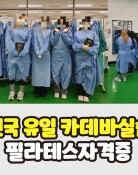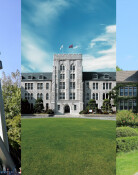Report: Little Progress at FTA Talks
Report: Little Progress at FTA Talks
Posted September. 11, 2006 06:03,
The third round of Free Trade Agreement (FTA) talks between Korea and the U.S., which began on September 6 (local time) in Seattle, Washington, ended with negotiations over trade remedies, labor, intellectual property rights, and auto industry the day before yesterday.
At a press conference after the negotiations with the U.S., Koreas chief negotiator Kim Jong-hoon said, There was not significant progress on the major issues of the talks as the two sides invariably adhered to their demands.
The two countries failed to narrow their differences on sticking points such as tariff elimination in textile industry, trade remedies and auto industry.
The fourth round of the FTA talks will be held in Korea from October 23 to 27.
No progress on contentious issues-
The two nations hardly eased off on their proposals for tariff concessions, service and investment reservations (list of industries excluded for opening) and request lists for services that they exchanged before.
Korea strongly demanded the U.S. to drastically open up its market in industrial goods and textile sectors. The U.S., at one point, submitted a revised proposal during the negotiation after Korea strenuously resisted its offer list on the two above sectors they exchanged in August. However, the U.S. stopped short of changing the overall frame such as the timing of opening up its market and just made changes to some of the items.
On the agriculture sector, Korea was on the defensive. The two sides mainly negotiated on items such as wheat and feed corn, of which U.S.s export to Korea is huge and Koreas output is minimal, but the U.S. was not satisfied with outcome of the talks.
In response to the strong demand from the U.S., Korea will present a revised offer list on agriculture based on corn and feed bean to the U.S. before the fourth round opens. Chief negotiator Kim stated, We didnt discuss the rice issue at all this time around.
Other sectors also still unresolved-
The U.S. again raised issue with Koreas tax system in which it imposed higher taxes on vehicles with bigger displacement engines in a working group meeting on auto industry. In addition, the U.S. demanded that Korea improve its tariffs, currently standing at eight percent, and various kinds of non-tariff barriers.
Mentioning the auto industry in two news conferences during the third round of talks, U.S. chief negotiator Wendy Cutler stressed, I hope the U.S. auto industry will export more cars to the Korean market.
Regarding the trade remedies, for which the two sides didnt even start to negotiate in earnest in the previous rounds, the two nations remained as far apart as ever.
For the issue of whether the U.S. would accept the goods manufactured in Gaesong Industrial Complex, North Korea as products made in the South, there was no improvement as the U.S. again argued that it was not for discussion.
Pace of talks to be accelerated-
At a final news conference, chief negotiators from the two countries said, We regret that there was no practical progress in the third round, and agreed that the two sides came to the stage where each should seek alternative plans acceptable for the other side.
For this reason, the two nations decided to speed up the talks by holding face-to-face or video meetings on time-consuming sectors such as place of origin, intellectual property rights, and medicines before the fourth round starts.
Meanwhile, some of the demonstrators against the Korea-U.S. FTA talks were taken to the local police while trying to break into the attached building of Convention and Trade Center in Seattle, an avenue of talks on September 9, the last day of talks. The police released them after being assured that protesters wouldnt commit illegal activities again.
smhong@donga.com







